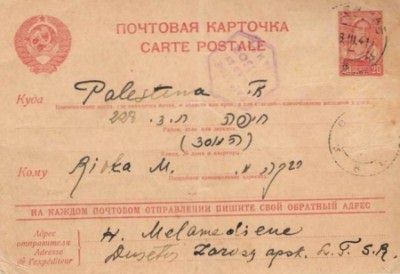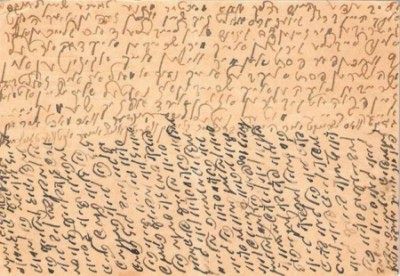
|

|
The USSR stamp bears the date 9 March 1941
|
|
|
||
The USSR stamp bears the date 9 March 1941 |
|||
From now on the postcards have a Russian heading, and the stamps and symbol are those of the USSR.
On the upper part of the card:
| My dear loved ones,
We haven't received a letter from you in a long time… Asher and Leibele ask how you are. We are writing to you two weeks before Passover, and wish you good health and a kosher Passover. I again ask that you both write. I can write you that Notel is already a father… His wife gave birth to a boy. Your mother Netl. Dear children, How are you and why don't you write? We await your reply. Asher Chaitowitz. |
On the second part of the card:
| My dear children,
I don't know what else to write, and I write you every two weeks, and have received no reply. I have good news to share with you. Avraham went to study in Vilna. He is being given 100 rubles, and I don't know what he will be studying. How are you my dear children? Our dear Sheine don't know Ella's address off by heart. Avraham used to write her… What's new with you? Do you lack anything? Up to now we do not lack anything, and God knows what the future will bring. It will soon be Passover. I remain only with Sheine. The children won't be coming. It is very sad. Send this postcard to Ella… From your mother – Henia Melamed. |
|
|
| Good Friends Chasya-Leah Levitt and Chaya-Henne Levitt |
Shmuel Levitt: My mother and Chaya-Henne used to sing Russian songs together, and they especially loved to sing aria from the famous operas.
| A postcard from Chantche, the daughter of Chaya-Henne Levitt to Batya Abel (the daughter of Chasya-Leah Levitt), Rehovot, Palestine
The stamp of the Dusiat Post Office bears the date of April 1941. |
|
| Dear Rivka and Batya,
In the name of our friendship I request that you write us how my brother Chaim [Levitt] is doing. We have received no news from him for over a year. We don't know his address. I wrote to Dov Caspi, who frequently wrote about him, and didn't receive an answer. Please write us the truth. What happened? Is he still alive?[3] It is hard to describe how broken-hearted we are. My mother is sick with worrying. Regards from your families. My mother also sends her regards. Write about your life. Best wishes from your friend Chantche Levitt.
From Ch. Levitt Dusetos
|
Footnote
Adina Rasman (Glick): In July 1939 I was in Kovno. We could already sense then that calamity was approaching. When I came home on vacation my mother told me that a certain Gentile woman had encouraged her to leave the shtetl, because “they are saying that they will slaughter the Jews…” Nevertheless they were complacent and didn't leave. And to where could they leave? I remember well what my mother said to me before I left home: “During the World War there were Germans here and they were good to us, and there were a few people in the shtetl who even got rich from their being here. You go, and don't worry.” And I made aliya to Eretz Yisrael.
Shayke Glick: In December 1940, during the Soviet period, Lithuanian students in Kovno organized a tour of their districts, Dusiat and its environs, and I joined them. Five years had already gone by since I had left home to the hachshara [training farm] in Posvel [Pasvalys] and in that entire time I had not visited the shtetl and had not seen my mother. When we drew near the shtetl I parted from the guys, and I remember that I walked through the Silvitzke's Grove, and at a certain point the ice suddenly cracked beneath my feet and I began to sink. I had apparently been walking across a ditch that was covered in a thick layer of ice.
I walked into the house with wringing wet clothes, and even before we managed to exchange words my mother immediately went to dry my clothes.
I found the shtetl like a destroyed town. It hadn't been damaged physically, but contagious apathy and melancholy reigned there. Most of my friends were already not in the shtetl, and from my group I only encountered Rivka Aires. She told me about the sad situation in the shtetl, and about the bitter fate of her brother-in-law Dovid-Leib Aires. My heart went out to Rivka. She remained with only her mother, with nothing to do…
I did not find open shops in the shtetl. The Russians had liquidated them all, and did not differentiate between capitalists and paupers.
My mother told me about her sister, Aunt Teibe, who had come for a visit from Russia (where she had fled to during WWI, and with the Sovietization of Lithuania she was able to return there), and that together they had been pondering what to do. My aunt said: “What will be, will be.” They didn't know what the future would bring, neither financially nor from the aspect of existence.
I arrived in the shtetl on Friday and left on Sunday.
Since Kristallnacht, a flow of refugees had begun streaming into Lithuania, and they related what harm the Germans had already done, and what their ideology was.
The politruks[1] used to come to the factory, make speeches and speak against the Germans, who were the enemy, even though there was a pact between Russia and Germany… Apparently the policy was to prepare us for war.
Although the air was full of gunpowder, the passiveness to their fate increased.
When the war between Russia and Germany broke out there was a major commotion in Kovno, and many people fled from the city and turned eastward. I was standing near a group of Jews and I heard one of them saying: “I will not leave everything I have acquired all my life to others, and I am staying here” …
Footnote
|
JewishGen, Inc. makes no representations regarding the accuracy of
the translation. The reader may wish to refer to the original material
for verification.
JewishGen is not responsible for inaccuracies or omissions in the original work and cannot rewrite or edit the text to correct inaccuracies and/or omissions.
Our mission is to produce a translation of the original work and we cannot verify the accuracy of statements or alter facts cited.
 Dusetos, Lithuania
Dusetos, Lithuania
 Yizkor Book Project
Yizkor Book Project
 JewishGen Home Page
JewishGen Home Page
Copyright © 1999-2026 by JewishGen, Inc.
Updated 23 Aug 2008 by LA